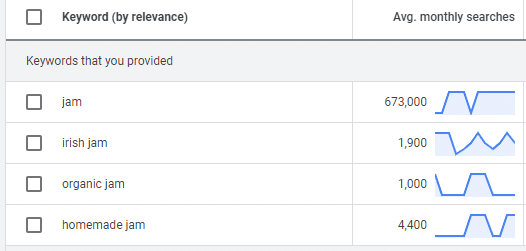The search engine result page (SERP) is the webpage a search engine displays to users to answer their search query. In other words, it’s page one (or two, or three…) of Google, or your preferred search engine, after you type something into the search bar and press ‘enter’.
Search engines aim to fill these pages with relevant results to provide the user with valuable information they are searching for. SEO, or Search Engine Optimisation, is the work that a company does to give their website the best ranking on a SERP. The first step in any SEO strategy is to define what keywords you will be targeting.
What are Keywords?
Keywords are the words that a consumer enters into a search engine such as Google or Bing to find relevant content that relates to their query. Recognising keywords that relate to your business is valuable, as it gives you the opportunity to appear to consumers searching for a product/service that you offer.
To appear to these high intent customers, it’s essential to incorporate phrases into your website content. Search engines crawl your website and pick up on these keywords. These phrases will be picked up by search engines, and ideally lead to your website appearing on the top of the search results page.
For example, if you are an Irish company selling jam online, you may want to incorporate the keyword ‘Irish jam’ into your content marketing strategy. The more you include Irish jam in your website content, the more likely you are to show up when a consumer searches for Irish jam online.
There are hundreds of factors influencing where your website ranks in search engine results, from how much ‘authority’ your website has, to other websites linking to it, to technical issues, but it all starts with keywords.
There are two types of keywords:
Short keywords are keywords that contain one or two phrases and are generally broad. Such as “Jam” or “Irish Jam”. These are often popular and competitive to rank for.
Long Tail Keywords contain three or more keywords and are more specific. Such as or “Organic Irish Jam” or “Home Made Irish Jam”. These may get less traffic, but it can be easier to rank highly for these.
What is search engine ranking?
Search engine ranking refers to the spot on the search engine results page that your website URL lands on. Your websites ranking is vital as it determines how much traffic your website will get. The highest-ranking website that appears on the number 1 position on Google gets 28.75% of clicks, and only 9.47% people click on websites on the second page of Google results. This shows how important it is to use SEO to appear on Google’s first page of results for your major keywords.
What is Keyword Research?
Keywords research is the process of finding search queries that your target consumer is typing into the search engine. Conducting keyword research is essential for SEO, as it can uncover valuable insights into what your target customer is searching for. Once you uncover the search queries your customers are searching for, you can focus on using these keywords throughout your website copy, blogs, and articles.
When you are deciding on which keywords you should target as part of your SEO strategy, here are three thing you need to consider:
Relevance
Your content must meet the searcher’s needs. Search engines rank content that provides the most value to the user more highly. Choosing keywords that both relate to your business and relate to your target customers’ needs provides them with valuable content.
Authority
On the search engine results page, search engines prioritise websites and sources they see as having more authority. To become an authoritative source on the topics your keywords cover, you should focus on providing rich content that benefits the reader. This encourages other sites to link to your content, generating backlinks.
If the search engine results page is filled with results from large organisations such as the BBC, it will be hard to rank on this page as they have significant search engine authority. If this is the case, try seeking out long-tail, less competitive keywords in your niche.
Volume
When choosing keywords to target, it is essential to analyse their monthly search volume. There are lots of keyword research tools out there, but we recommend Google Keyword Planner — it’s free, and it provides insights into the world’s most popular search engine. Monthly search volume measures the average number of searches a keyword gets per month. To get traffic to your website, you must target keywords that have a significant search volume.
If you are new to SEO or working with a new website, prioritising keywords with a slightly lower search volume may be a good strategy for you as you’ll have a better chance to rank for them. This is because large organisations with high authority typically go after keywords with a large search volume, making it hard for you to rank for these keywords.
For example, instead of focusing on a keyword such as “jam” with a high monthly search volume and high competition you could focus on a keyword with a lower search volume and lower competition “Irish organic jam” or “homemade raspberry jam,” as it will be easier to rank higher on the search engine results page. There are various mar-tech tools, such as Ahrefs, that measure keyword difficulty and show you the keywords that are easiest to rank for.

Creating an SEO strategy can be difficult, but defining keywords that are relevant to your business, have a significant search volume and are possible to rank for is a great place to start. If you are unsure of where to start and could use a digital marketing agency’s help, get in touch with us here at Sprint Digital.





